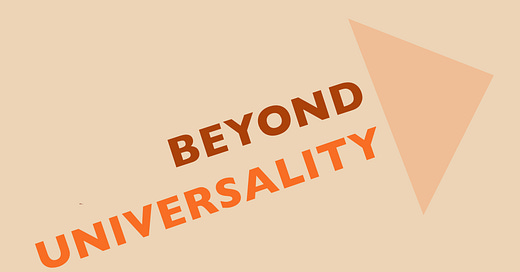Beyond Universality
I no longer seek universality, and in doing so, I can dream of something much larger than that.
Through publishing my work more frequently on Substack, I am constantly grappling with the fact that I don’t know who is reading my work. I don’t know the ways you are like me or unlike me.
I start hypothesizing ways in which my personal experience deviates from others. I wonder how I can possibly account for everyone.
Reading Roxane Gay’s book, Bad Feminist, has taught me that I don’t need to. In fact, I shouldn’t. Gay emphasizes the importance of multiplicity through a critique of Sheryl Sandberg’s book Lean In.
Lean In is a powerful and motivational book, but it is also limited to the experiences and position of Sandberg herself as the COO of Facebook and former VP of Google. These limitations were seen as negatives by critics. But Gay pushes back by considering the flip side: “if Sandberg chose to offer career advice for working-class women, a group she clearly knows little about, she would have been just as harshly criticized for overstepping her bounds.”
Critics want Sandberg’s book to apply to all women. But Gay argues that Sandberg’s book shouldn’t be treated as the “definitive text, or a book offering universally applicable advice to all women.” The desire to categorize a text as definitive is social pressures of having famous people serve as our societal loudspeakers.
We want Cathy Park Hong to tell us how to solve Asian hate. We want Roxane Gay to tell us how to be a better feminist. We want Sandberg to tell us how to be a more successful woman. But no single person has an answer to problems that are complicated and multifaceted. If they do, it is often lacking in nuance. The issues of our society are always interlinked by race, class and gender – all together, at the same time. Just as no experience exists in a vacuum, neither does any issue.
This is why representation is so essential. Gay, in her book, examines the need for representation in the context of entertainment, where it is often visibly lacking in it. In her essay, “Beyond the Struggle Narrative,” Gay criticizes the lack of diversity in Black stories: “It is not that slavery and struggle narratives shouldn’t be shared but that these narratives are not enough anymore.”
Gay has established the need for multiplicity. But achieving it is harder. Take social media: we all now have our own platforms, but it’s only become harder to hear others and for others to hear us. Differing conversations can either happen in silos, or together, holding differences in tow. In our digital world, we yearn for the latter but often only see the former.
In Tressie McMillan Cottom’s interview on the Ezra Klein podcast, she talks about the true effects of democratization. “We think that broadening access, will broaden access on the terms of people who have benefited from it being narrowed… Broadening it means that we are all equally uncomfortable… It’s now that everybody sits at the table, and nobody knows the exact right thing to say about the other people.” The digital world resists universality, both in its content and in its infrastructure.
At the individual level, this means that no person can be a true generalist. We are limited by our identities and our experiences. That’s not necessarily a bad thing, so long as we are not the only ones sitting at the table.
On Substack, a largely individual platform, I’ve grown more comfortable with acknowledging where I’m lacking and citing relevant work. I admire the work of Michelle Ma, a fellow Substack writer, who introduced me to a multi-tiered way of approaching an issue. She starts with the personal, but immediately zooms out towards the community and structural level.
I am eager to broaden the work that happens on Two Pages Double Spaced. Perhaps this means more essays like these. I no longer seek universality, and in doing so, I can dream of something much larger than that.




